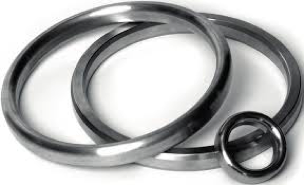Metallic gaskets
Ring joints

SealTec ring joint gaskets are machined from solid metal in a variety of shapes with high quality numerical control machines.They are designed for high pressure, high temperature or highly corrosive applications by selecting the most suitable
materials and shapes. All SealTec ring joint gaskets are forged and integral, non-welded.
R type oval ring joint gasket
Standard ring joint gaskets with oval cross section and designed for flanges with standard ring joint
grooves.
R type octagonal ring joint gasket
Standard ring joint gaskets with octagonal cross section and designed for flanges with standard ring joint
grooves. Interchangeable with GA9201 oval section gasket on modern octagonal grooved flanges.
RX type ring joint gasket
An adaptation of the standard R type ring joint gasket and designed to fit the same groove design as R type. It is interchangeable with the standard R type gaskets.
BX type ring joint gasket
Designed for very high pressures. All BX gaskets incorporate a pressure balance hole to ensure
equalization of pressure which may be trapped in the grooves. Only suited for API BX flanges and grooves.
Special combination ring joint gasket
The gaskets consist of two different sizes having the same pitch circle diameter. Used for sealing ring type joint flanges where the mating flanges have different ring groove diameters or profiles. These special combination ring joints are also available with either oval or octagonal facings.
Standard materials Maximum hardness Temperature range
Soft Iron* 90HB -60°C – +500°C (-76°F- + 930°F)
Low carbon steel* 120HB -40°C – +500°C (-40°F- + 930°F)
5Cr1/Mo 130HB -40°C – +650°C (-40°F- + 1200°F)
Stainless steel 304L, 321 160HB -250°C – +550°C (-418°F- + 930°F)
Stainless steel 316(L) 160HB -100°C – +550°C (-148°F- + 930°F)
Stainless steel 347 160HB -250°C – +550°C (-418°F- + 930°F)
*Gaskets made of soft iron or low carbon steel materials are normally applied with anticorrosive oil in final production.
Zinc electroplating is also available on customer’s special request, with a higher cost.
Other metal materials are also available on request.
Sealtec ring joint gaskets are manufactured in accordance with relevant standards (such as ASME B16.20, API 6A, etc.) to suit different flange designations (such as ASME B16.5, ASME B16.47 Series A, API 6B, API 6BX, etc.).
Machined metallic gaskets
Our various special machined metal gaskets are made from solid metal in a variety of shapes with high quality numerical control machines. They are designed for high pressure, high temperature or highly corrosive applications by selecting the most suitable materials and shapes
Lens ring gasket
Manufactured in accordance with DIN 2696, lens ring gaskets have spherical surfaces and are suitable for use with conical flange faces. They are used in high pressure applications and are resistant to overstressing. Effective sealing is obtained at a relativel low bolt loads.
Wedge gasket
The wedge gaskets are pressure activated gaskets for use on pressure vessel heads and valve bonnets for pressures of 1500 psi (10 MPa) and above. The cross section of the gasket is such that internal pressure acting against the ring forces it against the containing surface making a self-energized seal. They are normally plated with silver or lead, in order to provide a softer surface and minimize the force required to flow the gasket metal into the flange surface.
Delta gasket
The delta gaskets are pressure actuated gaskets used primarily on pressure vessels and valve bonnets
at very high pressures in excess of 5000 psi (34 MPa). Internal pressure forces the gasket material to
expand when the pressure forces tend to separate the flanges. Extremely smooth surface finishes of 63 micro inches or smoother are required when using this type of gasket.
Convex gasket
With convex surfaces, the gaskets are used where centralized loading of the gaskets are preferable
by a reduction in area.
Special machined gasket
Other custom made gaskets according to customer’s designs and drawings are also available. Hardness and temperature ranges depending on materials.

